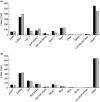Beverage consumption patterns and energy contribution from beverages per meal type: results from a national dietary survey in Sweden
- PMID: 30295227
- PMCID: PMC10260854
- DOI: 10.1017/S1368980018002537
Beverage consumption patterns and energy contribution from beverages per meal type: results from a national dietary survey in Sweden
Abstract
Objective: Many studies of food intake have been performed and published in Sweden, but to our knowledge no studies have extensively explored the beverage consumption of the Swedish adult population. The present study aimed to describe the beverage consumption and the contribution of beverage energy (including alcohol energy) to total energy intake according to gender, region of living, meal type and day for a Swedish adult population.
Design: National dietary survey Riksmaten (2010-2011), collected by the Swedish National Food Agency.
Setting: Sweden.
Subjects: A total of 1682 participants (57 % women) reported dietary intake data during four consecutive days, specified by portion size, meal, time point, day of the week and venue. Meals were categorized as breakfast, lunch, dinner and 'other'.ResultThe beverage reported to be consumed the most was water (ml/d), followed by coffee. Men had a higher consumption of juice, soft drinks, beer, spirits and low-alcohol beer, while the consumption of tea and water was higher for women. For both genders, milk contributed the most to beverage energy intake. Energy percentage from beverages was higher at lunch and dinner during weekends for both genders. Participants from the biggest cities in Sweden had a higher consumption of wine for both genders and tea for men than participants from other regions.
Conclusions: A considerable part of total energy intake was contributed by beverages, especially for men. Beverages can contribute to a more enjoyable diet, but at the same time provide energy, sugar and alcohol in amounts that do not promote optimal health.
Keywords: Adults; Alcoholic intake; Beverage consumption; Food habits; National dietary surveys; Riksmaten; Weekday weekend.
Figures

 , the three biggest cities (Stockholm, Gothenburg and Malmö);
, the three biggest cities (Stockholm, Gothenburg and Malmö);  , all other types of regions) among the nationally representative population of Swedish adults, Riksmaten 2010–11 national dietary survey: (a) men; (b) women. H-region differences by Whitney–Mann U test: *P<0·05, **P<0·01, ***P<0·001
, all other types of regions) among the nationally representative population of Swedish adults, Riksmaten 2010–11 national dietary survey: (a) men; (b) women. H-region differences by Whitney–Mann U test: *P<0·05, **P<0·01, ***P<0·001References
-
- Venci B, Hodac N, Lee SY et al.. (2015) Beverage consumption patterns and micronutrient and caloric intake from beverages in older adults with mild cognitive impairment. J Nutr Gerontol Geriatr 34, 399–409. - PubMed
-
- Swedish National Food Agency (2012) Riksmaten – vuxna 2010–11. Livsmedels-och näringsintag bland vuxna i Sverige (Riksmaten 2010–11. Intake of Foods and Nutrients Among Adults in Sweden). Uppsala: Livsmedelsverket; available at https://www.livsmedelsverket.se/globalassets/matvanor-halsa-miljo/kostra...
Publication types
MeSH terms
LinkOut - more resources
Full Text Sources

